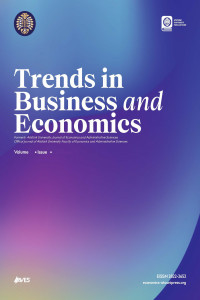BİLİŞİM ODAKLI BİR BÖLÜMDE OKUMANIN İNTERNET BAĞIMLILIĞINA ETKİSİ ÜZERİNE KARŞILAŞTIRMALI BİR ARAŞTIRMA
Bu çalışmada Atatürk Üniversitesi İktisadi ve İdari Bilimler Fakültesi Yönetim Bilişim Sistemleri Bölümü ile İşletme Bölümü öğrencilerinin; tolerans geliştirme, kontrol kaybı, sosyal ilişkilerde bozulma, iş ve okul performanslarındaki düşüşler ve yoksunluk hissi durumlarına göre internet bağımlılığı geliştirip geliştirmedikleri; dolayısıyla okunan bölümün bilişim odaklı olup olmamasıyla, internet bağımlılığı arasında anlamlı ilişkilerin var olup olmaması karşılaştırmalı olarak araştırılmıştır. Sonuç olarak; okunmakta olan bölümün bilişim odaklı olması ile internet bağımlılığı arasında anlamlı bir ilişkinin olmadığı ortaya konmuştur.
Anahtar Kelimeler:
İnternet Bağımlılığı, Yönetim Bilişim Sistemleri, Bilgi ve İletişim Teknolojileri, Bilişim
-
In this study is expressed that students have undergraduate study where management information systems department and department of business administration in faculty of economics and administrative sciences in Ataturk University in Erzurum in Turkey whether to do grow up internet addiction according to development tolerance, loss of control, negative consequences of social relations, negative consequences of work and power, withdrawal symptoms. In this context, in this study is researched that the relationships between department of undergraduate with informatics based and internet addiction. As a result, it is stated this factors don’t have significantly relations
Keywords:
Internet Addiction, Management Information Systems,
___
- Adiele, I. ve Olatokun, W. (2014), “Prevalence and Determinants of Internet Addiction among Adolescents”, Computers in Human Behavior. 31, ss. 100–110.
- Adıgüzel, O., Batur, H. Z. ve Ekşili, N. (2014), “Kuşakların Değişen Yüzü ve Y Kuşağı ile Ortaya Çıkan Yeni Çalışma Tarzı: Mobil Yakalılar”, Süleyman Demirel Üniversitesi Sosyal Bilimler Enstitüsü Dergisi, Sayı: 19, ss. 162-182.
- Chang, M. K. ve Law, S. P. M. (2008), “Factor structure for Young’s Internet Addiction Test: A Confirmatory Study”, Computers in Human Behavior, 24, ss. 2597–2619.
- Hahn, A. ve Jerusalem, M. (2010), “Die Internetsuchtskala (ISS): Psychometrische Eigenschaften und Validität”, Prävention, Diagnostik und Therapie von Computerspielabhängigkeit, ss. 185- 204.
- Hsu, W., Lin, S. S. J., Cheng, S., Tseng, Y. ve Chiu, N. (2014), “Examining the Diagnostic Criteria for Internet Addiction: Expert Validation”, Journal of the Formosan Medical Association, ss. 1-5.
- http://www.oxforddictionaries.com/definition/english/addicted; Erişim Tarihi: 03.09.2014
- Kardefelt-Winther, D. (2014), “A Conceptual and Methodological Critique of Internet Addiction Research: Towards a Model of Compensatory Internet Use”, Computers in Human Behavior, 31, ss. 351–354.
- Rodgers, R. F., Melioli, T., Laconi, S., Bui, E. ve Chabrol, H. (2013), “Internet Addiction Symptoms, Disordered Eating and Body Image Avoidance”, Behavıor, and Socıal Networkıng. 16 (1), ss. 56-60.
- Sariyska, R., Reuter, M., Bey, K., Sha, P., Li, M., Chen, Y., Liu, W., Zhu, Y., Li. C., Suárez-Rivillas, A., Feldmann, M., Hellmann, M., Keiper, J., Markett, S., Young, K. S. ve Montag, C. (2014), “Self-Esteem, Personality Comparison Study”, Personality and Individual Differences, 61–62, ss. 28–33. Internet Addiction: A Cross-Cultural
- Shaw, M. ve Black, D. W., (2008), “Internet Addiction Definition, Assessment, Epidemiology and Clinical Management”, CNSDrugs, 22(5), ss. 353-345.
- Sinkkonen, H., Puhakka, H. ve Meriläinen, M. (2014), “Internet Use and Addiction among Finnish Adolescents (15–19 Years)”, Journal of Adolescence, 37, ss. 123–131.
- Yao, M. Z. ve Zhong, Z. (2014)., “Loneliness, Social Contacts and Internet Addiction: A Cross-Lagged Panel Study”, Computers in Human Behavior, 30, ss. 164–170.
- Yu, J. J., Kim, H. ve Hay, I. (2013), “Understanding Adolescents’ Problematic Internet Use From A Social/Cognitive and Addiction Research Framework”, Computers in Human Behavior, 29, ss. 2682–2689.
- Başlangıç: 1977
- Yayıncı: Atatürk Üniversitesi
Sayıdaki Diğer Makaleler
ERZURUM İLİ TURİZM İŞLETMELERİ WEB KULLANIMI VE WEB SİTELERİNİN DEĞERLENDİRİLMESİ
Cetin AKKUŞ, Gülizar CENGİZ, Çetin AKKUŞ
AVRUPA BİRLİĞİ BÖLGESEL POLİTİKASININ BÖLGELERE ETKİSİ: BELÇİKA ÖRNEĞİ
Sabiha SEVİNÇ ALTAŞ, Hülya GÜNDÜZ ÇEKMECELİOĞLU
HASTANE İŞLETMELERİNDE KISITLAR TEORİSİ YAKLAŞIMI VE ÖRNEK BİR UYGULAMA
Süleyman YÜKÇÜ, İbrahim YÜKSEL
KADIN YÖNETİCİ SAYISI İLE TOBIN’S Q ORANI ARASINDAKİ İLİŞKİ: BORSA İSTANBUL ÜZERİNE BİR ANALİZ
Duygu ACAR ERDUR, Duygu ACAR ERDUR, Esen KARA
